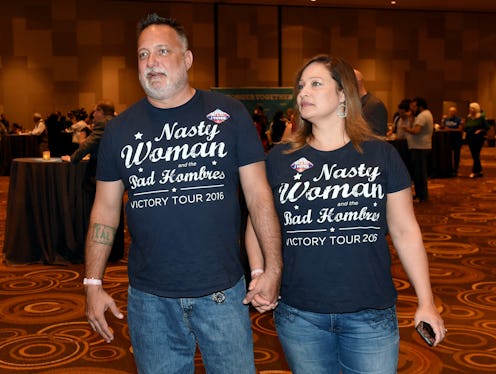News
The Nasty Woman Fundraiser Raised Thousands
The third presidential debate in October gave the country one of the biggest memes of the election cycle, but Donald Trump's "nasty woman" comment did a lot more than just make people laugh. Sales of one "nasty woman" t-shirt generated $100,000 in Planned Parenthood donations, according to the merchandiser Google Ghost. The massive donation reveals the power of collective action, and how much people can accomplish when they come together for the love of a meme — and for equal rights.
Though the surprising speed with which Nasty Woman merch became available online threw some for a loop (Google Ghost said in a statement that the shirt was available for sale before the debate had even ended), Clinton supporters loyally snatched it up and wore it with pride. A few celebrities, including Julia Louis-Dreyfus, Will Ferrell, and Katy Perry, were even seen sporting the shirt, further drove demand.
The polarization of the election, as well as the commodification of the comment into a meme with cultural significance, made the merchandise more valuable than just the sum of its parts. Google Ghost's enterprising foresight to seize that added value and donate it to charity was the final step in the process, which ultimately benefited Planned Parenthood to the tune of $100,000.
The nasty woman phenomenon shows how powerful people can be when they act together, and why it's important to pay attention to current events in the Meme Age. "Nasty woman" caught on so quickly that if you weren't watching the debate, you could have completely missed it. Also, without the politically active online communities that made "nasty woman" an instant meme, there would have been no added value to the shirts, and Google Ghost wouldn't have been able to donate as much to Planned Parenthood. People are stronger in numbers, which is why organization and coordination is key going forward under Trump's administration. When people are active and attentive politically, they can do amazing things and create value where there once was none.
Even if this activism is slightly motivated by pettiness, it still proves what people can achieve when they come together for a cause. The relative novelty of the internet means that people haven't quite figured out how to maximize the usefulness of digital communities for social problem solving, but viral fundraisers like these are a great start. The next challenge is to incite this kind of collective action without any dramatic precipitating incident, so that collective action can put this kind of money towards humanitarian causes with much higher frequency.
